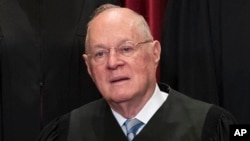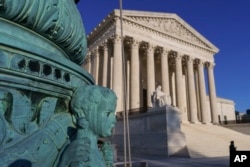Justice Anthony Kennedy, the key swing vote on the U.S. Supreme Court, announced his retirement on Wednesday, giving President Donald Trump a coveted opportunity make the second high court appointment of his term, pushing the bench further to the right.
During his 30 years on the bench, Kennedy, a Republican appointee, has often broken ranks with his conservative colleagues to cast the decisive vote in a string of consequential cases, including those involving abortion, gay rights and voting rights.
WATCH: US SCOTUS retires
His retirement becomes effective at the end of July.
In a statement, Kennedy, 81, said it had been his “greatest honor and privilege to serve our nation in the federal judiciary for 43 years, 30 of those years on the Supreme Court."
Trump called Kennedy a man of “tremendous vision” and said he’d "immediately" begin the search for a replacement.
A successor would likely create a solid five-member conservative majority on the court. Without Kennedy, the court would be split between four liberal justices who were appointed by Democratic presidents and four conservatives who were named by Republicans.
Kennedy's retirement, the subject of speculation over the past year, came on the last day of the high court's current term.
WATCH: Explainer on Supreme Court Justices
The powerful Supreme Court, made up of nine presidentially-nominated, Senate-confirmed members, is the country's top appellate and constitutional court. The court's rulings have far-reaching implications, shaping every facet of society.
In one of the most consequential decisions of its current term, the court on Tuesday upheld the Trump administration's controversial travel ban on citizens of five predominantly Muslim countries. Kennedy cast the pivotal fifth vote in the 5-4 decision.
In recent years, the Supreme Court has decided about 20 percent of cases by a 5-4 vote, with the outcome often turning on Kennedy's vote, according to Charles Geyh, a professor at the Indiana University Maurer School of Law.
Justice Kennedy "was at the center of many of those decisions and many of those decisions are among the most important decisions that the Supreme Court has made," Geyh, who is an expert on judicial selection, said.
Among his most noteworthy decisions, Kennedy co-authored a 1992 ruling that reaffirmed women's constitutional right to abortion, and in 2015 he wrote the majority opinion in a landmark decision that legalized same-sex marriage in the United States.
Sarah Warbelow, legal director with the Human Rights Campaign, a Washington-based LGBTQ advocacy organization, said Kennedy “was really the architect behind some of the most critical decisions impacting our lives.”
“He recognized the dignity of the LGBTQ people,” Warbelow said.
Kennedy’s retirement sets the stage for one of the most contentious Supreme Court confirmation battles in decades.While conservatives see a rare opening for another right-leaning high court appointment, liberals, are vowing to stop it, fearing a conservative-dominated court could reverse precedents on abortion and gay rights, among other decisions.
The minimum number of votes required for a Supreme Court justice nomination used to be 60. But Republicans changed the rules last year to reduce the minimum to a simple majority of 51, the number of members they have in the Senate.
The departure of Kennedy allows Trump, who ran on a campaign to appoint conservative justices to the Supreme Court, to make his second high court pick just 17 months into office.
Though he released a list of 20 conservative candidates for the supreme court during the campaign and added five more last year, Trump hasn't revealed his next high court pick, which could be announced any day.
Last year, Trump nominated conservative judge Neil Gorsuch to replace the late Antonin Scalia, reinstating the court’s 5-4 conservative majority and winning a string of favorable rulings.
Democrats fear that Trump may try to force a nomination through the Senate before the November Congressional election, which could decide which party gets to control the Senate and the House of Representatives.
Senate Minority Leader Chuck Schumer urged Republicans on Wednesday not to consider a vote for Trump’s next Supreme Court pick before the elections, reminding them of their refusal to hold a vote in 2016 for then President Barack Obama's nominee, Merrick Garland.
“Millions of people are just months away from determining the senators who should vote to confirm or reject the president’s nominee, and their voices deserve to be heard now, as Leader (Mitch) McConnell thought they deserved to be heard then. Anything but that would be the absolute height of hypocrisy,” Schumer said in a statement.
Geyh, the Indiana University professor, said it remains to be seen whether Trump makes a "strong, right-wing ideological appointment" or picks a more experienced judge akin to Gorsuch.
Whoever ends up joining the court, he said, Chief Justice Roberts is likely to serve as a force of moderation.
"Roberts is concerned about the legacy of the court, he’s concerned about a court that is perceived as upholding the court of law, and he’s concerned about a public perception that court is just a group of politicians in robes," Geyh said.
"And so, if the court turns on a dime and starts reversing decision after decision, it fuels the perception that this is nothing more than a group of naked political actors," Geyh said.
He noted that Roberts wrote the majority opinion in the Trump travel ban case but noted the chief justice also overturned Korematsu v. United States, the controversial 1944 Supreme Court ruling that upheld the U.S. government's authority to keep Japanese-Americans in military internment camps during World War II.
Roberts called the decision in Korematsu "morally repugnant."







